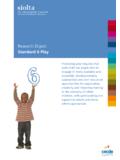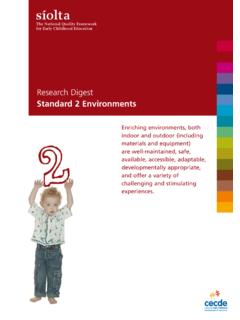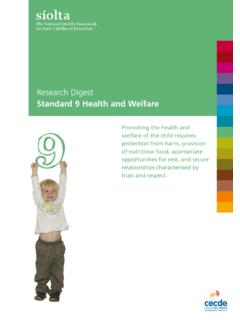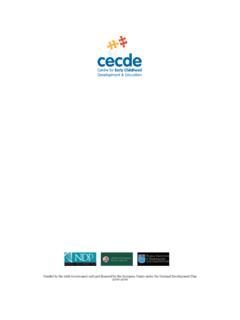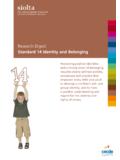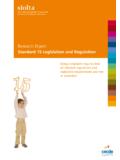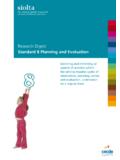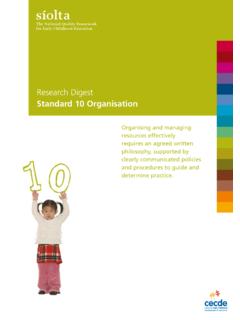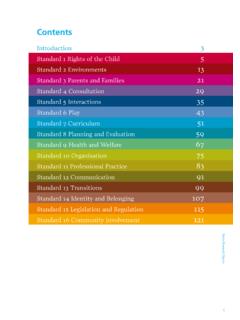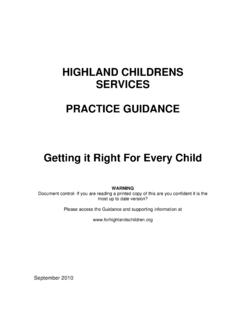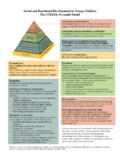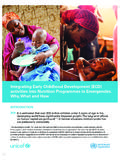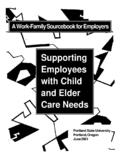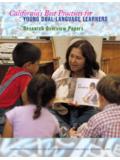Transcription of Research Digest - siolta.ie
1 The National Quality Framework for Early Childhood Educations oltaResearch Digest Standard 11 Professional PracticePractising in a professional manner requires that individuals have skills, knowledge, values and attitudes appropriate to their role and responsibility within the setting. In addition, it requires regular reflection upon practice and engagement in supported, ongoing professional development. Research Digest s olta Professional Practice Research Digest s olta Professional PracticeIntroductionThe role of the adult in supporting quality early childhood experiences for young children is absolutely central.
2 As Oberheumer and Ulich (1997) state, decisions made about staffing will be decisions made about the quality of services . In Ireland, since the mid-1990 s, we have been discussing the issue of how adults who work in early childhood care and education (ECCE) services for young children should be qualified. Important publications that record our national views on this issue include The National Childcare Strategy (Department of Justice, Equality and Law Reform [DJELR], 1999), Ready to Learn, the White Paper on Early Childhood Education (Department of Education and Science [DES], 1999), and The Model Framework for Education, Training and Professional Development in the Early Childhood Care and Education Sector (DJELR, 00 ).
3 S olta, the National Quality Framework for Early Childhood Education, (Centre for Early Childhood Development and Education [CECDE], 006) is the most recent expression of national consensus on professional practice and the aforementioned Standard is a summary statement of this consensus. Research Digest s olta Professional PracticeRecent ResearchQualifications All of the above mentioned policy documents, including S olta, have been informed by national and international Research on the relationship between adult qualifications and dispositions, and the quality of service provision in ECCE.
4 In Ireland, there is no statutory requirement to be formally qualified to work with young children in ECCE settings (except in the case of primary teachers in primary schools). However, a strong commitment to qualifications has been made in practice as Research has made it clear that there is a strong correlation between qualifications levels of adults working in services and the quality of the service. Many studies support this premise, including Arnett (1989) who discovered that a higher level of training in caregivers was related to more positive attitudes towards the children and less authoritarian styles of interaction.
5 Howes (1997) proposed that teachers with the highest levels of education scored best on the Classroom Interaction Scale, and that classrooms that complied with professional standards had more effective teachers and more positive child outcomes. While these US based studies could be considered to be from significantly different populations of practitioners than the Irish context, one of the most rigorous and respected Research studies of recent years has been conducted much closer to home in Britain and Northern Ireland. Amongst a wide range of noteworthy findings, the Effective Provision of Pre-school Education (EPPE) Project found that the higher the qualification levels among managers, the higher the setting scored on quality (Sylva et al.)
6 , 004).Values and principles Whilst qualifications are important, Research has also shown that professional practice in ECCE needs to be guided and informed by a set of core values and principles (Rodd, 006). These can be expressed as a code of ethics, which are usually developed by the membership of the ECCE sector. They are important because working with young children and their families is often challenging and regularly requires practitioners to make quick decisions without the support and guidance of other professionals. A code of ethics/set of core values is an essential support in such situations, as it ensures that practice is grounded in evidence.
7 It also assists practitioners in setting boundaries about what is acceptable professional behaviour (Dally, 007). In Ireland, the National children s Nurseries Association (NCNA) has published a useful document discussing ethical practice in ECCE. In this publication, the role of a code of ethics is described in detail and includes: ..assisting the practitioner in exploring solutions to complex situations; acting as a guide for early childhood professionals to maintain high standards; allowing childcare personnel to explore their motivation for working in a childcare setting (NCNA, 005:4).
8 Laevers ( 005) conducted a thematic review of non-traditional, highly regarded early education systems (High/Scope [USA], Reggio Emilia [Italy], Experiential Learning [Belgium] and Te Whariki [New Zealand]). He identified six characteristics of professional practice in early childhood education considered to be the cornerstones of any educational model of the future: Respect for the child An open framework (curriculum) approach A rich environment A process of representation Communication, interaction and dialogue Observation and monitoringReflective practice In much of the literature regarding professional practice in ECCE, reference is made to the importance of reflective practice and ongoing professional development as the essential processes to ensure that high standards of quality provision are maintained (Dahlberg et al.)
9 , 1999; UNESCO, 004). Reflective practice requires that the individual practitioner engages in thought processes that make her/him aware, in a critical way, of her/his everyday activities with a view to continuously improving and refining practice. These processes could be illustrated as follows:4 Research Digest s olta Professional PracticeFig. : Thought processes for improving and refining practiceProfessional developmentA practitioner s capacity to engage in reflective practice can be supported and enhanced by regular and ongoing professional development activities. These can take a variety of forms including attendance at conferences, observation of practice in other ECCE settings and formal in-service courses.
10 Research on Continuing Professional Development (CPD) courses for professionals highlights the fact that there are important characteristics that should be present if the course is to be effective. These include that the course: ..be embedded in the context of practice; engage and challenge the personal belief systems of the participant; stimulate and promote reflection in participants; integrate new knowledge with practice and recognise discourse as central to learning; recognise the need for continuity between old and new through practice; acknowledge the significance of the meaning making process and understand the need for time for its achievement (Duignan, 00 :51).
